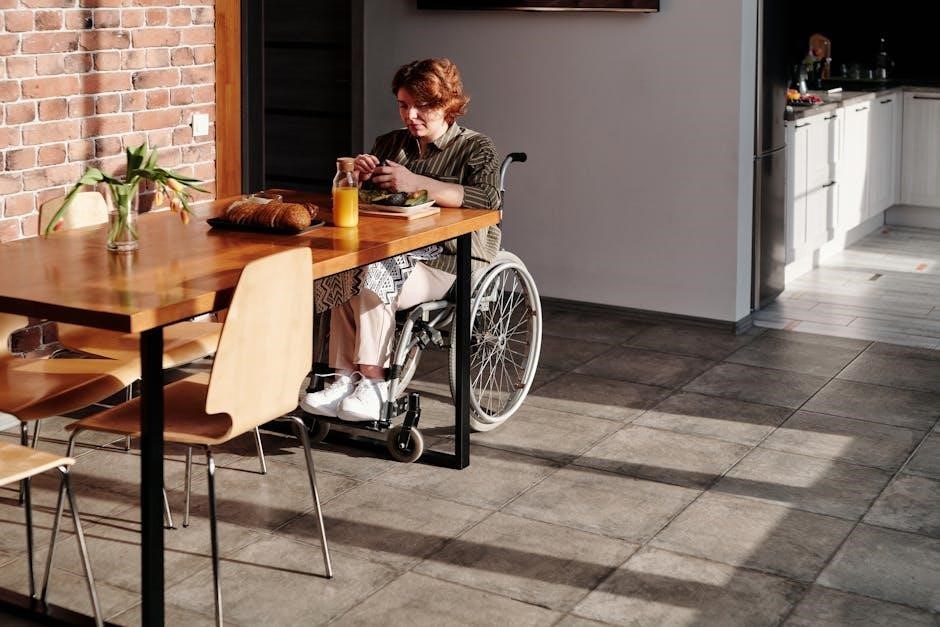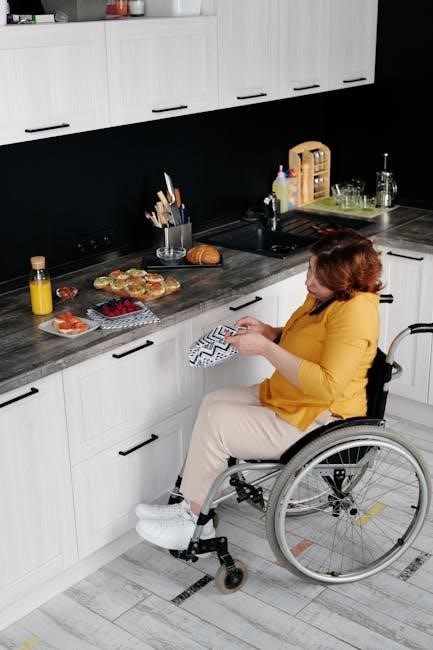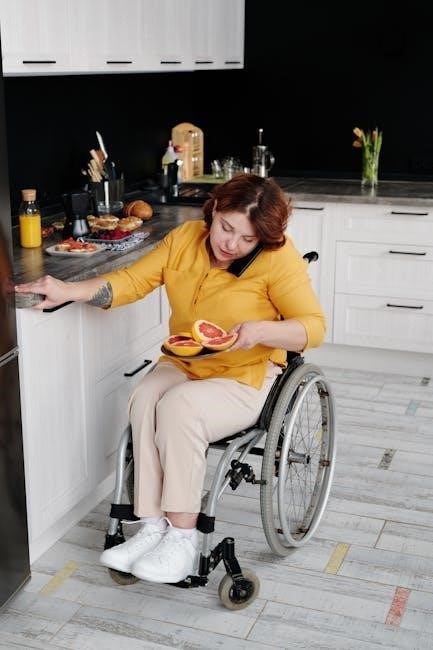
home health aide exam pdf
Download the Home Health Aide Exam PDF with study tips, practice questions, and a free study guide. Prepare for your certification exam today!
The Home Health Aide (HHA) exam is a critical step in becoming a certified caregiver‚ ensuring competence in patient care‚ safety‚ and medical knowledge to provide high-quality support in home settings.
Why Certification Matters for Home Health Aides
Certification as a Home Health Aide validates your expertise‚ ensuring patients receive high-quality‚ compassionate care. It builds trust with employers and clients‚ confirming your ability to meet standardized care requirements. Certification also enhances job prospects‚ as many agencies require it for hiring. By obtaining certification‚ you demonstrate professionalism and commitment to patient well-being‚ which is essential for advancing in this vital healthcare role.
Overview of the Exam Structure and Purpose
The Home Health Aide (HHA) exam evaluates essential skills and knowledge required for providing quality patient care. It includes multiple-choice questions and clinical skills assessments‚ ensuring competence in areas like personal care‚ medical terminology‚ and safety protocols. The exam’s purpose is to standardize care practices‚ confirming that aides meet federal and state requirements. Passing the exam demonstrates readiness to deliver compassionate‚ effective care in home settings‚ aligning with industry standards and patient needs.

Eligibility Requirements for the Exam
To qualify for the Home Health Aide exam‚ candidates must meet specific criteria‚ including completing approved training programs‚ being at least 18 years old‚ and passing a criminal background check.
Basic Qualifications and Training Needed
Prospective Home Health Aides must complete a state-approved training program‚ typically consisting of 75 hours of instruction‚ including 16 hours of clinical training. Candidates must be at least 18 years old and pass a background check. The training covers essential skills like patient care‚ infection control‚ and medical terminology‚ ensuring aides are prepared to deliver safe and compassionate care in home settings.
State-Specific Requirements and Variations
While federal guidelines set a foundation‚ Home Health Aide requirements vary by state. For example‚ Florida mandates the Home Health Aide Competency Test‚ which includes both written and clinical assessments. Other states may require additional training hours or specialized certifications. It’s essential to check local regulations to ensure compliance‚ as some states also have unique licensing processes or continuing education requirements for certification renewal.
Exam Format and Content
The Home Health Aide exam typically includes a written section with multiple-choice questions and a clinical skills assessment. It evaluates patient care‚ safety protocols‚ and medical terminology knowledge. Candidates have a set time to complete the test‚ which varies by state. This structure ensures comprehensive evaluation of both theoretical and practical competencies.
Breakdown of Question Types and Topics
The exam features multiple-choice questions‚ true/false statements‚ and scenario-based queries. Topics include patient care skills‚ infection control‚ medical terminology‚ and emergency procedures. Clinical skills like wound care and vital sign measurement are also assessed. The test evaluates knowledge of safety protocols‚ communication techniques‚ and legal/ethical considerations. Candidates must demonstrate understanding of daily living activities‚ nutrition‚ and mental health support. Familiarity with state-specific regulations is also required.
Understanding the Scoring System and Passing Criteria
The exam is scored based on correct answers‚ with a passing score typically set at 70% or higher. Questions are weighted‚ focusing on critical areas like patient care skills‚ medical terminology‚ and safety protocols. Candidates must demonstrate both theoretical knowledge and practical application. The scoring system ensures competence in providing safe‚ effective care. Familiarity with state-specific criteria is essential‚ as requirements may vary. Proper preparation and understanding of the scoring system are key to achieving certification.

Key Topics to Study for the Exam
Focus on patient care skills‚ medical terminology‚ infection control‚ and emergency procedures. Understanding these areas ensures a strong foundation for success on the certification exam.
Patient Care Skills and Safety Protocols
Mastery of patient care skills is essential‚ including proper hygiene practices‚ wound care‚ and safe transfers. Understanding safety protocols like emergency response‚ infection control‚ and use of protective equipment ensures patient well-being and compliance with health guidelines. These skills are critical for providing compassionate and effective care in home settings‚ addressing both physical and emotional needs while maintaining a safe environment for recovery and daily living.
Medical Terminology and Common Procedures
Understanding medical terminology and common procedures is vital for effective patient care. Home health aides must recognize terms like “mucous membrane” and “pressure points‚” and be familiar with procedures such as measuring vital signs‚ applying dressings‚ and using medical equipment. This knowledge ensures accurate documentation and safe execution of care tasks‚ addressing both routine and emergency situations with confidence and precision. Proper terminology also enhances communication with healthcare teams and supports patient well-being.

Important Skills and Qualities for Success
Empathy‚ communication‚ and attention to detail are essential for home health aides. Strong problem-solving and critical thinking skills ensure effective patient care‚ while compassion and reliability build trust and rapport with clients.
Clinical Knowledge and Practical Application
Clinical knowledge is vital for home health aides‚ covering topics like medical terminology‚ infection control‚ and patient care procedures. Practical application involves using this knowledge to perform tasks such as vital sign measurement‚ wound care‚ and medication assistance. Understanding how to identify complications and respond to emergencies ensures safe and effective care. This blend of theory and hands-on skills is essential for delivering high-quality patient support in home settings.
Communication and Interpersonal Skills
Effective communication and interpersonal skills are essential for home health aides to build trust and understanding with patients and their families. This includes active listening‚ empathy‚ and clear verbal and non-verbal interactions. Aides must also communicate effectively with healthcare teams to ensure coordinated care. Cultural competence and sensitivity are critical when interacting with diverse patient populations. Strong interpersonal skills foster a supportive environment‚ enhancing patient well-being and care outcomes. These abilities are tested in the exam to ensure proficiency.
Common Challenges and Misconceptions
Many candidates face challenges like complex questions and time management. A common misconception is that the exam is easy‚ leading to inadequate preparation and lower scores.
Difficult Areas of the Exam and How to Overcome Them
Medical emergencies and infection control are often challenging. Candidates may struggle with applying theoretical knowledge to clinical scenarios. To overcome these‚ focus on practical training‚ use flashcards for medical terminology‚ and practice with scenario-based questions. Regularly reviewing care protocols and seeking feedback from instructors can also build confidence and improve problem-solving skills‚ ensuring better preparation for these critical exam sections.
Myths About the Certification Process
A common myth is that the exam is overly difficult without proper study‚ but preparation materials like practice tests and guides can simplify the process. Another misconception is that prior medical experience is required‚ though training programs provide sufficient knowledge. Additionally‚ some believe certification is unnecessary for career advancement‚ yet it significantly enhances job prospects and professional credibility. Understanding these myths helps candidates approach certification with confidence and clarity.
Recommended Resources and Study Materials
Utilize official study guides‚ practice tests‚ and online courses to effectively prepare for the exam. These resources provide comprehensive insights and mock questions to ensure readiness.
Best Practice Tests and Study Guides
Effective preparation for the Home Health Aide exam requires high-quality study materials. Utilize official study guides that outline the exam structure and content. Practice tests with realistic questions mimic the actual exam experience‚ helping to identify weak areas. Flashcards and online tutorials are excellent for memorizing key terms and procedures. Ensure your materials are updated to reflect the latest industry standards and best practices in patient care.
Online Courses and Tutorial Videos
Online courses and tutorial videos are invaluable for exam preparation‚ offering in-depth lessons on patient care‚ medical terminology‚ and safety protocols. Platforms like Quizlet and YouTube provide interactive resources to enhance learning. These tools often include video demonstrations of clinical skills and real-world scenarios‚ helping candidates grasp practical applications. Additionally‚ they cover exam formats and question types‚ ensuring a comprehensive understanding of what to expect‚ thereby boosting confidence and readiness for the certification test.

State-Specific Exam Details
States like Florida require specific competency tests‚ such as the Florida Home Health Aide Competency Test‚ ensuring adherence to local healthcare standards and regulations‚ varying by region.
Florida Home Health Aide Competency Test
The Florida Home Health Aide Competency Test evaluates essential skills and knowledge for HHAs‚ focusing on patient care‚ medical terminology‚ and safety protocols. It includes both theoretical and practical assessments to ensure adherence to state-specific standards. The exam covers critical areas such as personal hygiene‚ wound care‚ and emergency response. Candidates must demonstrate proficiency in these areas to qualify for certification. Utilizing practice tests and study guides can effectively prepare for this exam‚ ensuring readiness for Florida’s specific requirements.
Other State Requirements and Differences
While certification standards for Home Health Aides share common goals‚ specific requirements vary by state. Some states mandate additional training hours or specialized modules‚ such as infection control or palliative care. For example‚ certain states include sections on local healthcare regulations or cultural competence. Additionally‚ exam formats may differ‚ with some states emphasizing clinical simulations or state-specific protocols. It’s crucial to review your state’s unique criteria to ensure compliance and effective preparation for the competency exam.

Exam Registration and Preparation Tips
Register for the exam through your state’s official certification portal or training program. Utilize study guides‚ practice tests‚ and online resources to ensure thorough preparation and confidence.
How to Register for the Exam
To register for the Home Health Aide exam‚ visit your state’s official certification portal or contact your training program. Submit required documents‚ such as proof of training completion and ID. Pay the exam fee‚ schedule a test date‚ and review preparation materials to ensure readiness; Some states allow online registration‚ while others may require mailed applications. Confirm specific requirements with your local certifying agency to avoid delays.
Effective Study Strategies and Time Management
Develop a structured study plan‚ allocating time for each topic like patient care and medical terminology. Use practice tests to identify weak areas and focus on improvement. Engage in active learning by taking notes and summarizing key concepts. Dedicate specific times daily to study and review materials consistently. Utilize online resources like flashcards and video tutorials to enhance understanding. Balance study sessions with regular breaks to maintain focus and avoid burnout. Prioritize tasks to ensure comprehensive preparation within the given timeframe.

Benefits of Certification
Certification unlocks enhanced career opportunities‚ higher salary potential‚ and increased credibility as a skilled home health aide‚ fostering professional growth and patient trust in your expertise.
Career Opportunities and Salary Advantages
Certification as a Home Health Aide opens doors to diverse career opportunities‚ including roles in private care‚ hospices‚ and healthcare facilities. Certified HHAs often enjoy higher salaries and greater job security compared to non-certified aides. Employers and patients trust certified professionals‚ leading to increased credibility and confidence in your abilities. Additionally‚ certification can pave the way for specialized roles or leadership positions‚ enhancing your career growth and satisfaction in the healthcare field.
Personal Satisfaction and Professional Growth
Becoming a certified Home Health Aide offers immense personal satisfaction by enabling you to make a meaningful impact on patients’ lives. The role allows you to build strong‚ trusting relationships with clients and their families‚ fostering emotional fulfillment. Professionally‚ certification enhances your skills and confidence‚ preparing you for advanced roles and continuous learning opportunities in healthcare. This achievement contributes to a sense of pride and long-term career satisfaction.